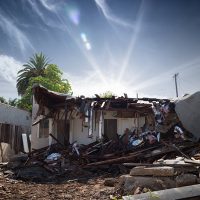“Total Losses” In Florida Homeowner’s Insurance Claims

When a Florida homeowner files a property insurance claim after a damaging event, there is an important distinction to be made between a total loss and partial loss. This can be confusing for claimants, especially those seeking homeowners insurance benefits for the first time after a fire, hurricane, or other event. However, knowing the difference between different types of losses can help you fight for your rights as an insured homeowner.
What is a “Total Loss” for Home Insurance in Florida?
The term “total loss” for these purposes is different from what most people think of as a “total loss”. In an auto insurance claim, for example, a total loss typically means the property is not recoverable. In a homeowner’s insurance claim, “total loss” means the costs to repair your home, as determined by an appraiser, surpass the total value of the property. Thus, it becomes a poor financial decision to repair the home, and more sensible to pay an insured the cost to rebuild completely or buy a different home.
Florida law protects homeowners in situations where a total loss occurs. Under Florida Statutes Sec. 627.702, the “Valued Policy Law” if a total loss happens after a “covered peril” under the homeowner’s insurance policy, the insurer is required to pay the full policy limits (even if the home is appraised for less than the full amount of the policy).
A partial loss refers to damage that can be repaired while keeping the rest of the home intact and functional. This is the more common type of claim that homeowners will have to deal with.
How is a “Total Loss” Determined in Florida Home Insurance Claims?
Florida courts follow an “identity test” standard for insurers to determine whether a property is a total loss under the Valued Policy Law. For example, if the identity and specific character of the building as a client’s home remains intact, it might not be considered a total loss. If the event and subsequent destruction was so severe that the building loses its character or “identity” as a family home, it could be considered a total loss for insurance purposes. Generally, these are referred to as “actual” total losses.
In some circumstances, a “constructive total loss” occurs. This is when a property maintains its identity and character, but because its continued use (or rebuilding) would violate a building code or ordinance, the home must be demolished.
In either situation, an insurer has a duty to make good on their end of the policy and pay the insured as the policy dictates. Unfortunately, insurers will often raise issues at this stage of the claim and try to pay less than what a homeowner may be entitled to. At this point it is critical for an insured to raise a dispute and consult a Florida property damage attorney if necessary.
Our Daytona, Florida Property Damage Attorneys Know Your Legal Rights in Total Loss Claims
The Daytona property damage insurance attorneys at Bundza & Rodriguez, P.A., can help if an insurance company is trying to nickel and dime their insureds when a payout for the full policy limit is warranted. After a total loss of the home, the homeowner has enough to worry about before dealing with an insurance company’s delays and denials. To learn how our attorneys can help in these situations, call our Daytona law offices today at 386-252-5170, or schedule a consultation with our Daytona Beach property damage attorneys online.
leg.state.fl.us/statutes/index.cfm?App_mode=Display_Statute&Search_String=&URL=0600-0699/0627/Sections/0627.702.html

